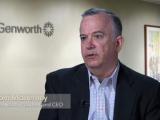Genworth 2015 Annual Cost of Care Study: While Long Term Care Costs Increase So Does Millennials Confidence in Future Care Plans
Cost to receive care at home continues to rise at a gradual pace
The 2015 Cost of Care study shows a continuing upward trajectory of the cost of obtaining long term care services. The cost of receiving care in a setting such as an assisted living facility or nursing home is dramatically increasing, while the cost to receive care at home through homemaker services or a home health aide is rising more gradually.
“There is something very difficult about facing some of the challenges and issues that come with aging, including the high costs of long term care services,” said Tom McInerney, president and chief executive officer at Genworth. “Part of our mission at Genworth with the Cost of Care study is to continue educating Americans on how to have tough conversations around long term care and the importance of planning. In fact, last year we embarked on a journey to help facilitate these discussions through our Let’s Talk national initiative.”
Rising Cost of Long Term Care
Nationally, the 2015 median hourly cost for the services of a homemaker or home health aide hired from a home care agency is $19.50 and $20, respectively. Homemaker costs have risen on average 1.6 percent annually over the past five years. Home health aide services have risen, on average, one percent annually over the past five years.
The cost to receive care in an assisted living facility is rising at a much faster rate. The median annual cost for care in an assisted living facility is $43,200. This represents an average increase of 2.5 percent over the past five years. The comparable cost for a private nursing home room is $91,250, which has increased 4 percent annually over the past five years.
Millennials Won’t Be Taken By Surprise
In further examining how Americans perceive this important social issue, Genworth commissioned a complementary study, “Aging Across Generations.” The research was aimed at understanding to what extent Millennials, Baby Boomers and older generations are familiar with long term care events and how prepared they are for their own future as a way of helping to put more context around the rising costs. Millennials have witnessed some of the challenges the older generations have faced, such as stock market swings, a troubled economy and high unemployment and are educating themselves on the importance of planning and taking proactive steps to plan for their futures.
Part of the reason Millennials are driving the conversation is to ensure a plan is in place and that their families can have a sense of security if a long term care event should occur. Genworth’s study revealed that females (65 percent) and Millennial generations (69 percent) are more likely to feel that the burden of providing long term care for their parents or grandparents will fall on them.
Generally, as adults age they have more familiarity with long term care events and they know more people who may have gone through a care issue. However, almost half of adults (47 percent) and Millennials (49 percent) assign a failing grade to their parents or loved ones due to not planning for, or talking about, their long term care needs. However, Millennials (56 percent) think they will plan for their long term care needs more effectively than previous generations because they are better informed and have better resources available to them.
“Millennials have more insight and information available to us than any generation before, and Genworth’s study shows we’re determined to use it all,” said Nadira Hira, renowned journalist and author of a forthcoming book on Millennials and leadership. “What remains to be seen is whether we can translate that intellectual awareness into meaningful action. That’s why it’s so important to start this conversation early, learn from our elders’ experiences, and take advantage of whatever resources we can to plan for the future.”
Planning today can help save families from facing a crisis tomorrow. Having the right talk, the right way, at the right time, can ease the emotional and financial pressures of planning for long term care needs. Knowing the cost of long term care services and financing options available can help Americans age gracefully in the setting where they are most comfortable.
Learn what financing options are appropriate for your needs:
- Medicare pays for long term care if you require skilled services or rehabilitative care such as in a nursing home (max 100 days) and at home if you are also receiving skilled home health or other skilled in-home services (provided for a short period of time). For more information please visit longtermcare.gov.
- Medicaid covers a large share of long term care services but to qualify your income must be below a certain level and you must meet minimum state eligibility requirements and be in a Medicaid-approved facility. For more information please visit Medicaid.gov.
- If you qualify, private payment options such as long term care insurance, linked benefits products or long term care riders on other insurance can help fill the gap between public assistance and the high cost of long term care services. For more information please visit https://www.genworth.com/long-term-care-insurance/source/get-the-facts/options.html.
- Saving for long term care on your own can be difficult and take years to accumulate funds. To learn more information and see if self-funding will take care of your long term care needs please visit https://www.genworth.com/long-term-care-insurance/source/make-a-plan/payment-options/self-funded.html.
Keep in mind that individual plans can combine several of these approaches.
About Genworth’s 2015 Cost of Care Study
Genworth’s annual Cost of Care Survey is one of the most comprehensive studies of its kind, covering nearly 15,000 long term care providers nationwide. The survey includes 440 regions which include covering all Metropolitan Statistical Areas defined by the 2014 Office of Management and Budget. Genworth annually surveys the cost of long term care across the U.S. to help Americans plan for the potential cost associated with the various types of long term care available in their preferred location and setting. The survey also provides state-specific cost of care data for all 50 states and comparison to the national median. CareScout®, part of the Genworth Financial family of companies, has conducted the survey since 2004. Located in Waltham, Massachusetts, CareScout has specialized in helping families find long term care providers nationwide since 1997. Genworth’s 2015 Cost of Care Survey was conducted during January and February 2015.
About Genworth’s “Aging across Generations” Study
The “Aging across Generations” omnibus study was conducted in collaboration with an independent third party research firm, J&K Solutions, LLC. The data from this omnibus study was collected from an online survey over the course of 3 days in February 2015. A demographically representative sample of 1,228 adults ages 18 and older across the United States were surveyed providing a highly stable and reliable data source. The sample follows the framework of the U.S. Census data for age, ethnicity, gender, region and income. This allows for estimates of the stated population within +/- 3% with 95% confidence, unless otherwise noted.
About Genworth Financial
Genworth Financial, Inc. (NYSE: GNW) is a leading Fortune 500 insurance holding company committed to helping families become more financially secure, self-reliant and prepared for the future. Genworth has leadership positions in long term care insurance and mortgage insurance and competitive offerings in life insurance and fixed annuities that assist consumers in solving their insurance, retirement and home ownership needs.
Genworth operates through three divisions: U.S. Life Insurance, which includes long term care insurance, life insurance and fixed annuities; Global Mortgage Insurance, containing U.S. Mortgage Insurance and International Mortgage Insurance segments; and the Corporate and Other Division, which includes the International Protection and Runoff segments. Products and services are offered through financial intermediaries, advisors, independent distributors and sales specialists. Genworth, headquartered in Richmond, Virginia, traces its roots back to 1871 and became a public company in 2004. For more information, visit genworth.com. From time to time, Genworth releases important information via postings on its corporate website. Accordingly, investors and other interested parties are encouraged to enroll to receive automatic email alerts and Really Simple Syndication (RSS) feeds regarding new postings. Enrollment information is found under the "Investors" section of genworth.com. From time to time, Genworth’s publicly traded subsidiaries, Genworth MI Canada Inc. and Genworth Mortgage Insurance Australia Limited, separately release financial and other information about their operations. This information can be found at https://genworth.ca and https://www.genworth.com.au.
Media Contacts:
Al Orendorff
Genworth
804-662-2534
[email protected]
Jessica McGinn
Prosek Partners
212-279-3115 ext. 256
[email protected]
Video Gallery
Photo Gallery
Download the Videos
Tom McInerney, Genworth President and CEO Elena Edwards, President Long Term Care Insurance Chris Conklin, Genworth Senior Vice PresidentDocuments
Genworth’s Aging Across Generations Study Cost of Care Key Findings Tom McInerney Biograph Nadira Hira Biography Elena Edwards Biography Chris Conklin BiographyVisit
Genworth.com 2015 Cost of Long Term Care Map and Survey Let’s Talk – Conversations That Matter Genworth R70 Age Simulation Suit Genworth Long Term Care Options










